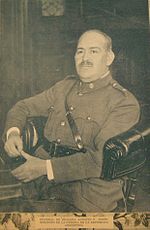Argentine general election, 1931
|
|
|||||||||||||||||||||||||||||
|---|---|---|---|---|---|---|---|---|---|---|---|---|---|---|---|---|---|---|---|---|---|---|---|---|---|---|---|---|---|
|
|||||||||||||||||||||||||||||
|
|||||||||||||||||||||||||||||
|
|||||||||||||||||||||||||||||
Agustín P. Justo
National Democratic Party
The Argentine presidential election of 1931 was held on 8 November. With a turnout of 73.4%, it produced the following official results:
aAbstentions.
Following months of protest triggered in part by the onset of the great depression, a quiet coup d'état deposed the aging Hipólito Yrigoyen in September 1930. His country's first leader elected via universal suffrage (though without the participation of women), Yrigoyen had strained alliances within his own centrist Radical Civic Union (UCR) through frequent interventions against willful governors and had set business powerhouses such as Standard Oil against him through his support of YPF, the state oil concern founded in 1922. Staging its first coup since 1861, the Argentine military, then dominated by conservative, rural interests, called on José Félix Uriburu, a retired general and member of the Supreme War Council, to assume the role of Provisional President. Uriburu, the nephew of former President José Evaristo Uriburu, had no taste for politics and was in ailing health.
He nevertheless set down an ambitious agenda, entrusting his Interior Minister, Matías Sánchez Sorondo, to replace the 1912 Sáenz Peña Law (which provided for universal male suffrage and the secret ballot) with one promoting a single, ruling party not unlike the one that kept the landowner-oriented National Autonomist Party (PAN) in power from 1874 to 1916. Aligning themselves behind the relatively moderate National Democratic Party, conservatives were defeated in gubernatorial polls in the paramount Province of Buenos Aires in April 1931. The results not only raised hopes for the centrist, urban-oriented UCR, it also persuaded Uriburu that Sanchez Sorondo's "electoral reform" would not keep conservatives in power, in and of itself.
...
Wikipedia


